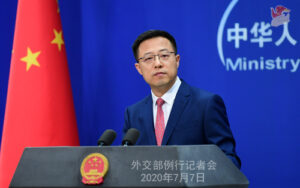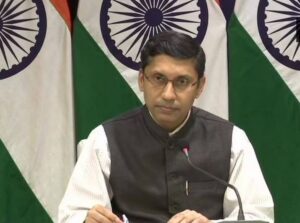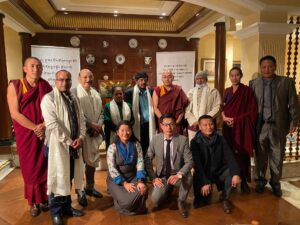
Arunachal Pradesh
China and India’s border row continues with China’s Ministry of Civil Affairs confirming their renaming of 15 places in Arunachal Pradesh, the northeastern Indian state that China claims as its own territory calling it “Little Tibet”.The Chinese Ministry announced that place names are standardised according to regulations on geographical names issued by China’s cabinet. The renamed places include eight residential areas, four mountains, two rivers and one mountain pass, reports the India Today.
This is the second time China has issued standardised names in Arunachal Pradesh, the first was in 2017, soon after His Holiness the Dalai Lama’s visit to the state that year.

Photo: Zhao Lijian
On December 31 last year, Zhao Lijian, China’s Foreign Ministry spokesperson, announcing the authority of management in Arunachal Pradesh, said, “For standardised management of the area, the competent authorities in China in accordance with relevant regulations have published the names for the relevant area. These are matters that are within China’s sovereignty”.
In response to China’s action, the Indian Government’s External Affairs Ministry spokesperson Arindam Bagchi said, “We have seen such reports. This is not the first time China has attempted such a renaming of places in the state of Arunachal Pradesh.” He continued, “Arunachal Pradesh has always been, and will always be an integral part of India. Assigning invented names to places in Arunachal Pradesh does not alter this fact”.
The Tibet-India border row between China and India continues, with the Daily Mail reporting on China using unmanned machine-gun mounted vehicles to patrol the border, saying these unmanned vehicles are aimed at combatting the problem of Chinese troops being unable to operate effectively at the high altitudes in the Himalayan border regions.

Indian Government’s External Affairs Ministry spokesperson Arindam Bagchi
While China and India’s on-off border conflict continues, the All-Party Indian Parliamentary Forum for Tibet (APIPFT) has been revived following lobbying by a Tibetan Parliamentary delegation. The delegation members reached out to 38 Indian lawmakers during a 10-day campaign. Khenpo Sonam Tenphel, Speaker of the Tibetan Parliament-in-Exile (TPiE), visited Delhi to meet the delegation members and the Director of the India Tibet Coordination Office (ITCO); the meeting was followed by the relaunch on December 22. APIPFT was first established in 1970.
The Indian Express reported that those Indian MPs who attended the launch event for APIPFT each received a letter signed by the Chinese embassy’s political counsellor Zhou Yongsheng, urging them not to support Tibetans. The letter from the Chinese Embassy in Delhi to those MPs stated, the “so-called ‘Tibetan Government in-Exile’ is an out-and-out separatist political group. China firmly opposes any anti-China separatist activities conducted by “’Tibetan independence’ forces in any capacity or name in any country and opposes any forms of contact by officials of any country with them.” He continued, “Understand the sensitivity of the issue and refrain from providing support to the ‘Tibetan independence’ forces, and make contributions to China-India bilateral relations”.

Tibetan MPs hosted a dinner reception at New Delhi for Indian MPs Photo: TPiE
The Tibetan Parliament-in-Exile’s response slammed China for their illegal occupation of Tibet. “Historically Tibet has never been a part of China. Since the illegal and violent occupation of Tibet, China has oppressed the Tibetans under its brutal and draconian policy. Tibetans inside Tibet are deprived of their fundamental rights and the situation inside Tibet remains grim till date. Hence, the Tibetan issue is not an ‘internal affair’ as China has repeatedly claimed but a critical concern on Tibetan existence. The violation of international human rights law and hegemony of the neighbouring nations by China should be a concern for the international community,” said TPiE in a press statement
TPiE’s statement continued, “It becomes evident that China is intimidated by the growing support for the Tibet movement around the world. The leaders of free countries have all their rights and responsibilities to support the just cause of Tibet and we vehemently condemn this move by China”.
Tibetan MPs further expressed that it is no surprise that the Chinese government has acted in this manner, as they have been repeatedly acting this way over the years. Tibetan MPs say they would welcome an “equal and non-conditional” dialogue with the Chinese government to resolve the issue of Tibet.




 Print
Print Email
Email